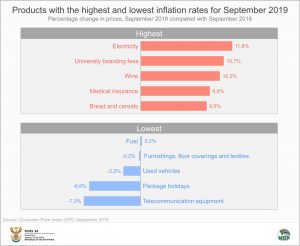
CPI inflation edges lower in September
South African annual consumer inflation slowed in September, falling to 4,1% from 4,3% recorded in August.
The inflation rate has hovered between 4% and 5% since December last year and has been below 4,5% for the past three months. More significantly, it has remained below the South African Reserve Bank’s (SARB) 6% monetary policy ceiling since April 2017.
The product groups that carry the largest weight in the inflation basket – such as food and non-alcoholic beverages, housing and transport – have had the most influence in keeping the headline rate at modest levels. Together, these three categories make up over half of the basket and all three recorded an annual increase below 5% in September.
The product groups that had the highest annual price increases in September were electricity and university boarding fees. In terms of electricity, the National Energy Regulator of South Africa (Nersa) sets electricity prices and tariffs while taking a range of factors into account. Electricity supply in recent years has also been characterised by increasing costs in an environment of low economic growth, contributing to the rise in prices.
Prices for tertiary education accommodation have increased in recent times, mainly due to a rise in demand.
Wine prices have been climbing steadily since the 2016 drought. In particular, the 2019 harvest is the lowest since 2005 and strong export demand further limits local availability.1
Bread and cereal prices have increased significantly in the past 12 months due to poor harvests. Within this product group, super maize prices increased 15,7% year-on-year in September, and special maize by 31,3%. Brown bread prices were up by 7,6%.
The product groups that had the largest negative annual rates were telecommunications equipment and package holidays. The sharp deflation in telecommunications equipment –which consists mainly of cellphones – stems from the fact that the CPI is a constant quality index. In simple terms, this means that the improvement in phone features outstrips any price increases introduced when new models are released.
Declining prices in domestic holiday packages may stem from the current poor economic conditions. Western Cape has seen the biggest provincial decrease in package prices, registering a 9,3% fall over the last 12 months.
Motorists keenly follow announcements of monthly changes in fuel prices. The price of inland 95-octane petrol in September was R16,03 per litre, 5c lower compared with R16,08 recorded in September 2018.2
For more information, download the Consumer Price Index (CPI) release for September 2019 here.
1 WineLand Media, SA Harvest report 2019 (read here).
2 Department of Energy, Comparing prices for petrol, diesel and illuminating paraffin (IP) (click here).
Similar articles are available on the Stats SA website and can be accessed here.
For a monthly overview of economic indicators and infographics, catch the latest edition of the Stats Biz newsletter here.


